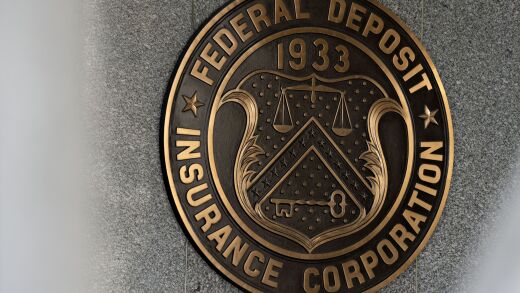A national moratorium would be costly to lenders and servicers, but proponents say it's needed to help cushion the economic blow of the pandemic.
The actions include cutting the federal funds rate to between 0% and 0.25% and other steps to ease economic stress from the spread of the coronavirus.
The banks — including JPMorgan Chase, Bank of America, Wells Fargo and Citigroup — agreed to stop buying back their own shares through the second quarter, saying they will focus on supporting clients and the nation during the coronavirus pandemic.
The actions include cutting the federal funds rate to between 0% and 0.25% and other steps to ease economic stress from the spread of the coronavirus.
The OCC and FDIC said banks should consider waiving fees, be flexible with loan repayments and that they would not be penalized if they close branches for precautionary reasons.
The biggest U.S. banks are once again preparing to show how they'll be able to withstand a severe economic shock in a hypothetical doomsday scenario, and they're eager to get on with it as a real one unfolds.
Banks typically don't offer loans to cash-strapped consumers, and are poorly positioned to start doing so on an emergency basis — unless the government steps in to help.
At least seven states have suspended K-12 classes, meaning many CUs with student-run branches won’t be able to operate those facilities as educational tools during that time. More industry events have also been called off.
-
A national moratorium would be costly to lenders and servicers, but proponents say it's needed to help cushion the economic blow of the pandemic.
March 15 -
The actions include cutting the federal funds rate to between 0% and 0.25% and other steps to ease economic stress from the spread of the coronavirus.
March 15 -
The banks — including JPMorgan Chase, Bank of America, Wells Fargo and Citigroup — agreed to stop buying back their own shares through the second quarter, saying they will focus on supporting clients and the nation during the coronavirus pandemic.
March 15 -
The actions include cutting the federal funds rate to between 0% and 0.25% and other steps to ease economic stress from the spread of the coronavirus.
March 15 -
The OCC and FDIC said banks should consider waiving fees, be flexible with loan repayments and that they would not be penalized if they close branches for precautionary reasons.
March 13 -
The biggest U.S. banks are once again preparing to show how they'll be able to withstand a severe economic shock in a hypothetical doomsday scenario, and they're eager to get on with it as a real one unfolds.
March 13 -
Banks typically don't offer loans to cash-strapped consumers, and are poorly positioned to start doing so on an emergency basis — unless the government steps in to help.
March 13 American Banker
American Banker











